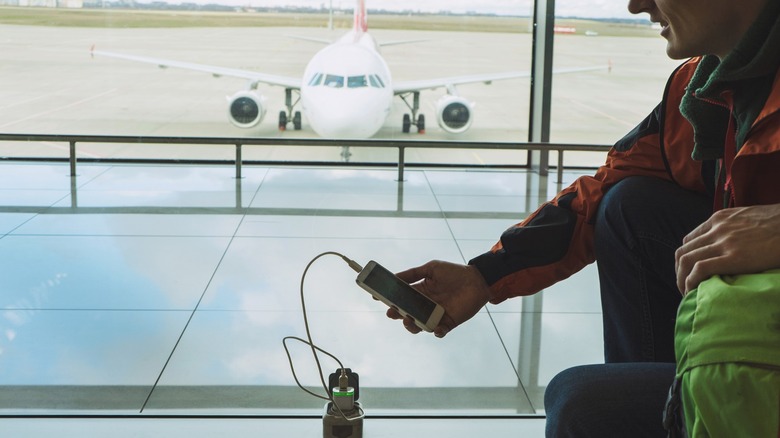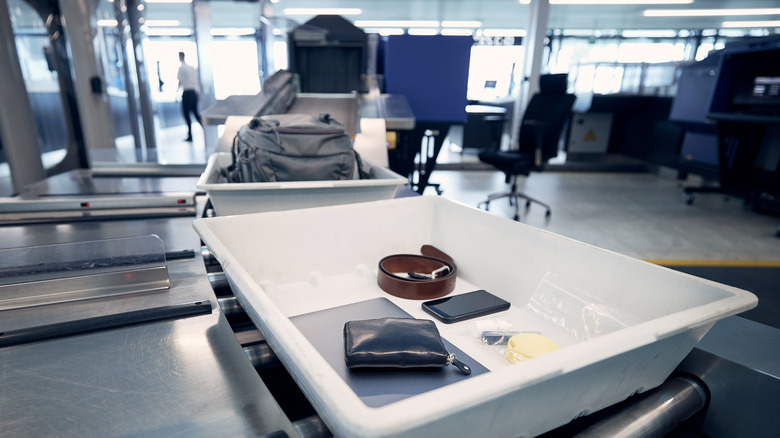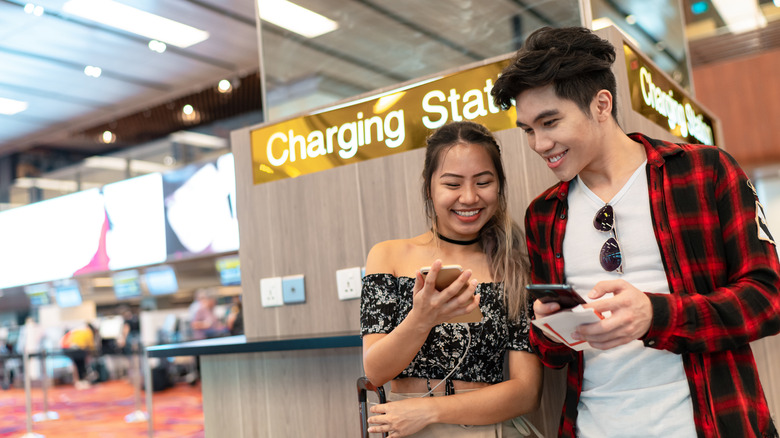The Unexpected Reason Your Electronic Devices Need To Be Charged While Going Through TSA
If you're the "oops, my phone just died" type of person whose electronics, from laptops to tablets, always seem to lose their charge at the most inopportune times, this article is for you. In the ever-evolving realm of air travel, the Transportation Security Administration (TSA) has a variety of stringent security measures that they enforce for the safety of passengers. Among these measures — from removing shoes to the prohibition of some bizarre items considered to be liquid — is the requirement that your electronic devices need to be charged and functional when you pass through security checkpoints. While this might seem like an inconvenience (especially for people whose phones are chronically at 1%) or just another obnoxious TSA rule, there is a compelling and unexpected reason behind this protocol.
Since its creation in the aftermath of the 9/11 attacks, the TSA's mission has been to ensure safe and secure freedom of movement for passengers. In response to evolving threats, TSA continuously adapts its protocols. The mandate for charged electronic devices emerged in response to intelligence indicating that terrorists could use uncharged dummy devices to conceal explosives. Historically, terrorists have attempted to detonate bombs hidden in everything from Commodore scientific calculators to Panasonic transistor radios — thankfully, their plots were thwarted in time. Today, a device that can't power on will raise suspicion because it could potentially be a shell for a dangerous component rather than a harmless gadget. However, if the TSA already uses explosive trace detection machines, why the extra rule?
What to expect at the TSA checkpoint
U.S. intelligence and other law enforcement agencies believe there is evidence that terrorist organizations have engineered explosive devices that are not easily detected by the airport screening technology that's currently at the TSA's disposal (via CNN). Ultimately, the goal is to verify that electronic devices are what they appear to be — functional and benign. As a result, it has been reported that Apple and Samsung Galaxy devices, as well as passengers flying to America from countries in Africa, Europe, and the Middle East, will receive more stringent scrutiny at security checkpoints.
The TSA states on its website, "Officers may ask you to power up your electronic device, including cell phones. Powerless devices will not be permitted onboard the aircraft." Officers also make the final decision on whether a device passes through or gets confiscated. When you approach the airport security checkpoint, you might be asked to power on any or all of your electronic devices, including smartphones, tablets, laptops, cameras, and e-readers.
This request might come as a surprise, especially for passengers who might be unaware of the requirement or if your device happens to be low on juice or out of charge altogether. To avoid any delays or complications, you should ensure that all of your devices are fully charged before arriving at the airport. This proactive step will help you have a stress-free, smooth security process and ensure that you aren't left without access to your essential devices during your journey.
Charged-up tips for travelers with electronics
Beyond the security implications, having your devices charged up before a flight is responsible common sense. Your smartphone or tablet is often the primary means of communication, both for staying in touch with loved ones ("About to take off, Mom!") and for accessing important travel information, like electronic boarding passes. A charged device also helps ensure that you receive real-time updates about your flight status and gate changes via apps or email. Besides, in case of emergencies, having a functional device is crucial.
If you are notorious for not charging your electronics, there are two things that can save you: charging stations at airports with designated power outlets and portable chargers, which you should never forget to bring while traveling. Note that power banks and portable chargers are prohibited in checked bags because of Federal Aviation Administration (FAA) rules regarding lithium ion batteries. Hopefully, this will encourage passengers to keep their devices connected to the power bank and charged up for the security line.
Enrolling in a program like TSA PreCheck or Clear can help expedite the security screening process, including the checks of your electronic devices, particularly laptops, as they do not have to be removed from your bag. However, your electronics still need to have enough charge to turn on if requested by an officer. The next time you prepare for a flight, remember to charge your devices — it's a small step that makes a big difference in air travel safety and your TSA screening.


